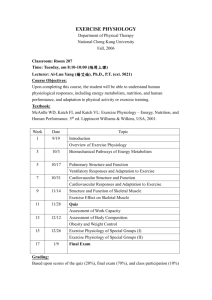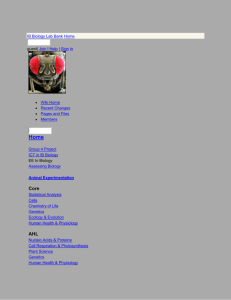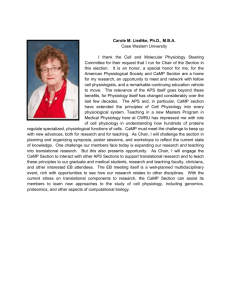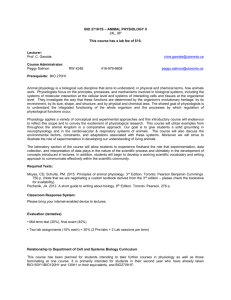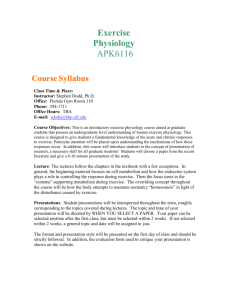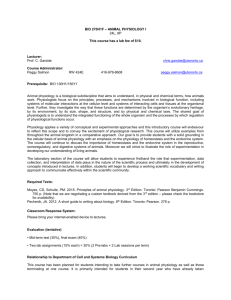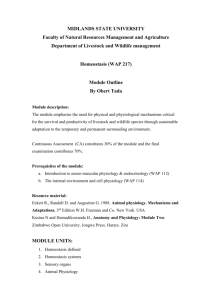March 8, 2010 - School of Medicine
advertisement
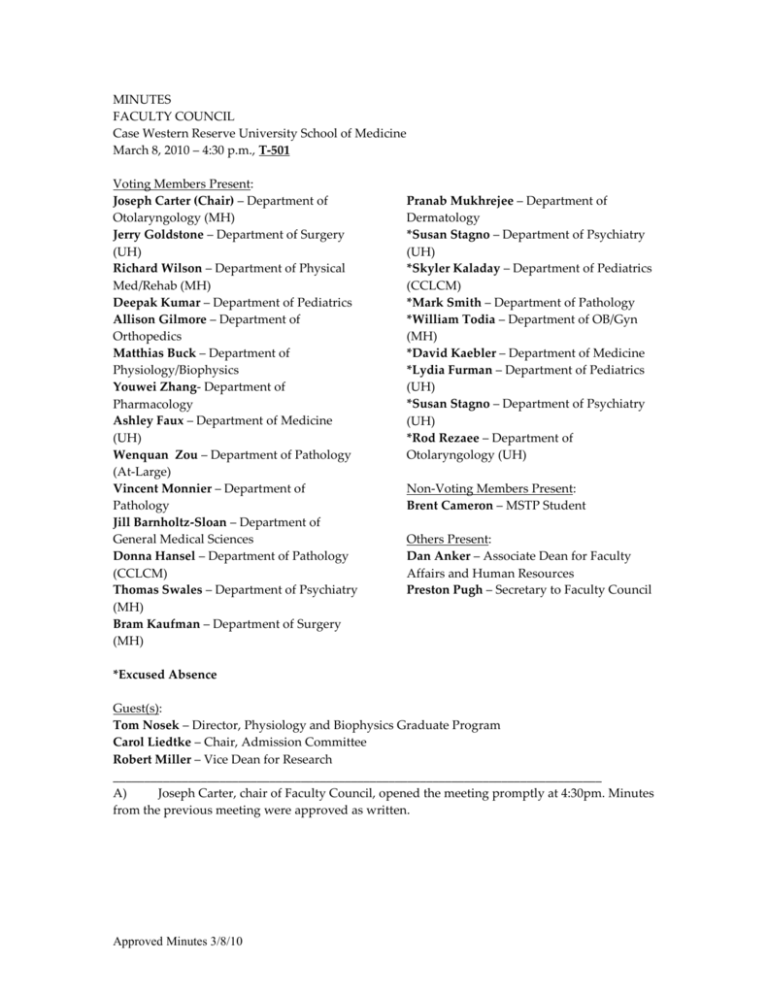
MINUTES FACULTY COUNCIL Case Western Reserve University School of Medicine March 8, 2010 – 4:30 p.m., T-501 Voting Members Present: Joseph Carter (Chair) – Department of Otolaryngology (MH) Jerry Goldstone – Department of Surgery (UH) Richard Wilson – Department of Physical Med/Rehab (MH) Deepak Kumar – Department of Pediatrics Allison Gilmore – Department of Orthopedics Matthias Buck – Department of Physiology/Biophysics Youwei Zhang- Department of Pharmacology Ashley Faux – Department of Medicine (UH) Wenquan Zou – Department of Pathology (At-Large) Vincent Monnier – Department of Pathology Jill Barnholtz-Sloan – Department of General Medical Sciences Donna Hansel – Department of Pathology (CCLCM) Thomas Swales – Department of Psychiatry (MH) Bram Kaufman – Department of Surgery (MH) Pranab Mukhrejee – Department of Dermatology *Susan Stagno – Department of Psychiatry (UH) *Skyler Kaladay – Department of Pediatrics (CCLCM) *Mark Smith – Department of Pathology *William Todia – Department of OB/Gyn (MH) *David Kaebler – Department of Medicine *Lydia Furman – Department of Pediatrics (UH) *Susan Stagno – Department of Psychiatry (UH) *Rod Rezaee – Department of Otolaryngology (UH) Non-Voting Members Present: Brent Cameron – MSTP Student Others Present: Dan Anker – Associate Dean for Faculty Affairs and Human Resources Preston Pugh – Secretary to Faculty Council *Excused Absence Guest(s): Tom Nosek – Director, Physiology and Biophysics Graduate Program Carol Liedtke – Chair, Admission Committee Robert Miller – Vice Dean for Research ______________________________________________________________________________ A) Joseph Carter, chair of Faculty Council, opened the meeting promptly at 4:30pm. Minutes from the previous meeting were approved as written. Approved Minutes 3/8/10 B) Robert Miller, Vice Dean for Research, discussed the purpose of this committee. The committee is comprised of elected and appointed members from both the clinical and basic science departments of the medical school. These members are engaged primarily in research. Recent meetings have dealt with the Biomedical Engineering (BME) as a department in both the School of Medicine and the School of Engineering. Issues have been resolved and are in process with each new faculty member in BME would be designated at the time of initial appointment as principally based in either the School of Engineering or the School of Medicine with the appropriate school’s standards applying. Dr. Miller told the Council that the Research Committee continues to discuss and make recommendations to the Dean regarding graduate education funding. A Systems Biology and Bioinformatics program has been proposed by Mark Chance. This program would increase the importance to Biology and Medicine. As opposed to the reductionist approach the in the past 50 years has identified individual pieces of biological systems, this new science attempts to understand the integration of these pieces into networks, complexes and the biological organizations critical to cellular and organism functions. Few institutions have such a innovative and diverse program. Dr. Miller told Council that a current focus of the Research Committee is to review the SOM Cores and Centers. There was a sense that we needed to define what Cores and Centers we want and to define characteristics of what works well. Many of them here are fragmented. Some of them needed and others that are not. In response to questions, Dr. Miller Council discussed those concerns of Cores and Centers and an issue was raised regarding the necessity to review the demand for Cores. In some departments, there has been an increase in volume and some of the Cores seemed overwhelmed by the extra work. One particular issued brought forth is that outside institutions and companies offer the same, but cheaper and faster services than some of the cores can deliver. A Council member suggested that the Faculty be surveyed to examine its uses and needs. Dr. Miller noted that The Center for Stem Cell and Regenerative Medicine, Case Center for Imaging Research, and other Cores have been recognized by Ohio's Centers of Excellence in Biomedicine and Health Care. This has helped build stronger connections in the community including projects with Swagelok. Dr. Miller stated that larger Cores seem they way of the future rather than smaller ones. Continued discussion led to the School of Medicine strategic plans. Dr. Miller told Council that there have been a number of strong recruitments over that past few years and doing as well as one could anticipate. However, there is a need to revive strategic plans for both the University and the School of Medicine. Dr. Miller reiterated that the overall issues revolving around graduate students are still a work in progress. One of the main issues is still how to get a larger number of graduate students in the School of Medicine and how to fund them. Other schools seem to do a better job at accomplishing this, but the Dean is committed to working out some type of solution. One suggestion has been to allocate some of the Dean’s funds to this issue. However, the question becomes should the dean be responsible for such a huge cost (1-2 million est.) and is the best use of that resource. Dr. Miller continued to note that the school is making Approved Minutes 3/8/10 great strides including new recruitments, training grants, and our research programs are getting stronger. An issue was raised by a Council member concerning curtailing of research support of tenured faculty in the process of renewing their NIH grants. In particular, issuing of letters of termination to people working in close relationship with senior faculty might result in immediate savings but huge long-term losses if the tenured faculty member is unable to renew his/her grant as a consequence. The Council member recommends that departmental chairs work with their faculty toward supporting their research endeavors to avoid long-term funding problems. Dr. Miller gave details of a Bridge Funding Program. The program allows funds from the Dean to be given when there is a gap in between grants. Faculty can apply for this through me (Dr. Miller). It is a rolling review with about a month to receive and answer. So far, 15-20 faculty have used it and has worked well thus far. C) Tom Nosek, Director of Graduate Education (Physiology and Biophysics), presented a proposed MS in Medical Physiology program. The program proposal had been previously reviewed, following the usual School of Medicine process, by an ad hoc committee composed of graduate program directors, members of the Faculty Senate Graduate Studies Committee, and the Faculty Council Steering Committee. The Master’s Program in Medical Physiology is designed for students with a bachelor’s degree who are seeking advanced training in the physiological sciences, typically in preparation for admission to a professional medical program (e.g. Medical School, Dental School). The program is flexible in duration. Dr. Nosek explained that the program can take as little as 1 year (2 semesters, 9 months) to complete the required 30 credit hours of course work. However, students who wish to decompress the program can take 14 months or more to complete the requirements. Core courses and flexible electives allow students to focus their work in key areas of medical physiology, including Anatomy, Biochemistry, or Pharmacology. Graduates of the Medical Physiology Master’s Program also can pursue careers in basic and clinical research, research administration, teaching or management in academia, the pharmaceutical and biotechnology industries, private research institutions, government science or regulatory agencies, or medicine and health care. Thus, in addition, to providing a pathway to medical and dental school, the proposed program would offer an important economic advantage for Northeast Ohio by training a pool of individuals constituting a highly educated work force, which in turn would retain and attract biomedical industry. Students will earn a plan B type MS from Case Western Reserve University. The core of this degree is 18 hours of course work in the Department of Physiology and Biophysics: 2, 6 hour courses in Medical Physiology, 2, 2 hour courses in Translational Physiology, and 2, 1 hour Physiology Seminar courses. The Medical Physiology courses will be conducted as lecture courses. The Translational Physiology course will be conducted as a combination of both lectures and clinical paper discussions. The Physiology Seminar will require students to attend the weekly physiology seminar followed by a discussion session where a recent paper by the seminar Approved Minutes 3/8/10 speaker will be discussed. The remaining hours required for graduation are flexible, taking into account each student’s unique background and career plans. To successfully complete the program, students must pass a comprehensive examination after all coursework has been successfully completed for a Plan B type master’s degree. The examination will be in the form of a written paper (at least 10 – 20 pages long) where the student will be given the opportunity to display their understanding of physiology and other biophysical sciences that they have studied during the program. This program will complement the plan A type MS that the department currently offers for students preparing for a career in laboratory research. Continued discussion by Council members led to finding that the proposed program has merit and will be beneficial for the school and those students who would be interested in applying to the program. According, the Council and voted unanimously to recommend approval of the program. D) Carol Liedtke, Chair of the Admissions Committee, presented the annual report to Faculty Council. Dr. Liedtke presented extensive written materials summarizing admissions data. The Admissions Committee met 12 times during this academic year. The Admissions Committee also reviewed and approved the admissions decisions from the MSTP Steering Committee and the Cleveland Clinic Lerner College of Medicine (CCLCM) Admissions Committee. This year, we were asked to compose a class of 199 (152 for the University Program, 32 CCLCM, and 15 for MSTP). 924 interviews were conducted from 5,107 applications for the University Program (UP). We continue to have difficulty in finding enough qualified interviewers, but are very grateful to our current interview committee who devote much energy and time to our process. The 2009-2010 total applicant pool for the University Program was 5,107, reflecting a 5% increase from 2008-2009. Nationally, medical school applications increased by only 0.09% compared to the previous year. Our secondary application completion rate for the UP achieved the highest rate seen in recent years at 77% (3,948 of 5,107). To date, the Committee has offered acceptances for the University Program to 378 applicants (including 2 deferred students from and 08-09) to achieve a class of 152. We experienced a higher rate of attrition last year largely due to financial determinants. Some applicants that withdrew stated they truly desired to come to Case but were financially obligated to choose another school with a lower cost of attendance. Dr. Liedtke stated that we (SOM) continue to participate in the AAMC’s Criminal Background Check program for accepted applicants. The background checks are conducted by a third party contracted by the AAMC. The entire process is electronic and the turnaround time on a CBC is approximately 3 days. The process is very efficient. To date, no significant violations or findings have been discovered by the background check on our incoming students. Dr. Liedtke continued to state that the goal of the Admissions Committee is to recruit exceptionally talented students from across the country through targeted recruitment trips by Dr. Mehta and Mr. Essman. Last year, our visits to college campuses were somewhat limited due to budget restrictions. Despite these limitations, we were able to visit Yale University, Columbia University, Harvard University, University of Los Angeles-California, University of California-Irvine, Case Western Reserve University, and Kent State University. We are scheduled to visit University of Michigan and Emory University later this spring and are considering other opportunities at the University of Alabama, Vanderbilt University, Johns Hopkins University and the University of Chicago. Approved Minutes 3/8/10 Dr. Mehta has been integral for acquiring and creating a new scholarship for a Health Professions Pipeline Program (H3P) for minority students. On February 24 th, the Joan C. Edwards Charitable Foundation announced it will make a significant investment in the city of Cleveland to create a medical education pipeline for students from traditionally underrepresented minorities and lowincome backgrounds. The first phase of the Joan C. Edwards Charitable Foundation’s Health Profession Pipeline Program (H3P) is the creation of the Edwards Scholarship Endowment at Case Western Reserve University. An initial investment of $10 to $12 million over 10 years will establish an endowment for full-tuition scholarships for students to earn bachelor and medical degrees at Case Western Reserve. The Admissions Office continues to operate a nearly paperless system. This year we used the letters of recommendation service provided by AMCAS. AMCAS collects and uploads all letters of recommendation and makes them available through the electronic application. There is no charge to medical schools for this service. This new service made reviewing applications even easier since reviewers did not have to use VPN to review the letters of recommendation. Dr. Liedtke concluded her presentation by asking for more faculty to become involved as faculty interviewers. Training sessions will take place in August. Please let Dr. Liedtke know if you are interested. E) Joseph Carter informed Council that a meeting with the Dean has been scheduled for March 18, 2010. The meeting will discuss proposed changes to the structure of Faculty Council and also give the Dean an opportunity to express her thoughts. Others in attendance are Nora Lindheim and Mark Smith. F) Dan Anker told Council that Faculty Senate elections are still open and please vote by March 10, 2010. Dr. Anker also informed Council of the “How to Maximize Your Chances of Being Promoted” program scheduled for April 8, 2010. This program is sponsored by the SOM Faculty Affairs Office and the Women Faculty of the School of Medicine. There being no further business, the meeting adjourned. Respectfully submitted, Preston Pugh - Faculty Secretary Approved Minutes 3/8/10


